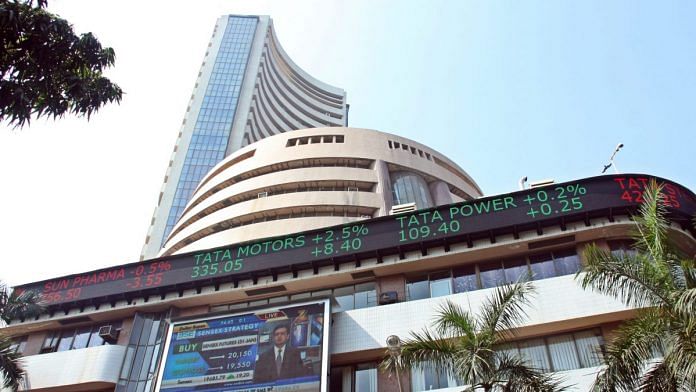New Delhi: In the last six years, under the Narendra Modi government, the total market cap of all public sector firms and banks fell by 36 per cent even as the market cap of all Bombay Stock Exchange-listed companies and Sensex indices have almost doubled in the same period.
If the government had given up control of the PSUs that have lost market value, then it would have proved its credentials towards being genuinely reformist considering it just passed “brave” reforms in labour and agriculture, said ThePrint’s Editor-in-Chief Shekhar Gupta in episode 605 of ‘Cut the Clutter’.
Dissecting fall in market cap of PSUs
In May 2014, the total market cap of all public sector companies was Rs. 19.1 lakh crore but as of 28 October this year, it stands at Rs. 12.2 lakh crore. Therefore, government-owned companies have lost Rs. 6.9 lakh crore in the past six years.
There has also been a sharp fall in the share of public sector firms and banks in the total market capitalisation of all listed companies. PSUs accounted for 22.8 per cent of the value of all companies listed on BSE in May 2014, but now they account for only 7.7 per cent of the total value.
“So, this is a loss of nearly 15 percentage points,” said Gupta.
Gupta also mentioned the data published by The Financial Express, which states that the loss of value of the PSUs is actually Rs 21 lakh crore.
He explained that this figure reflects what the value would have been if PSUs had also grown in their worth. If that was the case, then PSUs today would be Rs 21 lakh crore worth more than what they are now.
That is the loss of value for us as citizens, as shareholders of these companies, he added.
The comparison of PSUs with other BSE-listed companies is also stark.
All BSE-listed companies have added 89 per cent to their value and Sensex companies added 87 per cent. The small cap index of BSE has also risen by 365 per cent — from Rs 4,83,000 crore in May 2014 to Rs 22,44,000 crore now, which is a four-fold increase.
Similarly, the absolute value of Sensex increased from Rs 41,62,000 crore to nearly Rs 78 lakh crore in the same period, which is almost double.
The midcaps have also gone up by 66 per cent in the same period, from Rs 13,31,000 crore to Rs 22,09,000 crore.
The BANKEX, an index for banking stocks, has gone up from Rs 8,93,000 crore to Rs 16,85,000 crore.
“So it’s not as if the markets under the Modi government have done badly,” Gupta added.
Also read: Tax revenues decline 22% in April-September, at one-fourth of full year target
PSUs losing value
But public sector banks like the State Bank of India, which started out at Rs 3.05 lakh crore, today stands at Rs 1.7 lakh crore. Similarly, Punjab National Bank, Bank of Baroda and Canara Bank are all in the Rs 30,000 crore ballpark, added Gupta.
“There is a consistent pattern that wherever the government has kept control over a company, it has lost value,” he said.
Even PSUs that own monopolies in certain sectors are losing value like Coal India Limited.
“Every now and then the government vacuums money out of cash-rich PSUs either through share buyback or special dividends leaving them with no money to invest, expand and compete in the marketplace,” observed Gupta.
He pointed out that seven major central public sector enterprises (CPSE), which account for 44 per cent of the net worth of all CPSEs, are valued below their book value. Book value refers to the total assets of a company with liabilities and intangible assets deducted.
These include Bharat Heavy Electricals Limited (BHEL), Indian Oil Corporation Limited (IOCL), NHPC Ltd, NTPC Ltd, Oil and Natural Gas Corporation Ltd (ONGC), Power Finance Corporation (PFC) and Steel Authority of India Ltd (SAIL)
Even ONGC, which used to be the government’s “crown jewel”, has shrunk to one-fourth of its value in 2014, due to the acquisition of Hindustan Petroleum Corporation Limited and other factors.
Also read: Banks have not a signed a single agreement for RBI’s debt recast scheme for high value loans
Divestment and reformist agendas
Using Hindustan Zinc and BALCO as examples, Gupta pointed out that even when the Indian government divests certain companies, it’s residual shareholding in these companies is greater than the company’s value itself.
“I’m surprised why the government is not selling that shareholding and taking that money off the table because it is their money,” he said.
For example, the watch company Titan was owned by the Tamil Nadu government and was valued at nothing. Then it came under the purview of the Tatas.
“Today, the Tamil Nadu government owns more shares in the company than Tata, but they don’t interfere in the management,” said Gupta. The state government’s 27 per cent shareholding is worth more than Rs 30,000 crore today, he added.
“This is what happens when governments give up their hubris,” said Gupta.
Borrowing from the words of former Prime Minister and finance minister Manmohan Singh, Gupta said the true test of a reformist mindset is when the government is willing to give up its own powers.
That said, the government recently made a “brave” announcement that it will now divest all companies it runs, except in 18 strategic sectors and not more than four companies in those sectors.
Watch the latest episode of CTC here:




Time for government to go for stake sale in its ‘crown jewel’ ONGC to institutional investors if not retail ones. It’s still a highly asset heavy and undervalues firm.